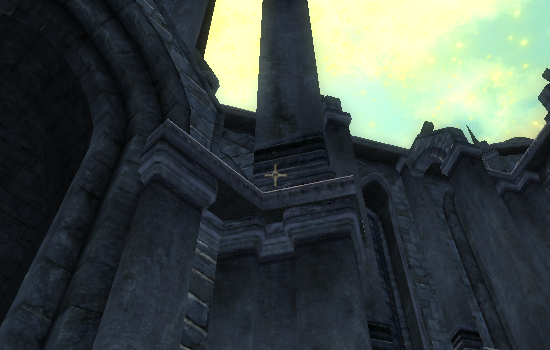The Radeon HD 4850 & 4870: AMD Wins at $199 and $299
by Anand Lal Shimpi & Derek Wilson on June 25, 2008 12:00 AM EST- Posted in
- GPUs
AA Comparison
And now the fun part: playing around with images. Certainly everyone has their own taste when it comes to AA, but we've cropped and blown up this 800x600 screenshot from Oblivion in order to better show what's really going on. As resolution increases and pixel size decreases, the impact of higher AA modes also decreases. This is useful to keep in mind here.
A few key points to check out: compare the interior of textures between either no AA image and any of AMD's tent filters. Notice how the detail on interior textures is significantly decreased. It can be quite frustrating to enable a high anisotropic filtering level to increase the detail of textures only to find them blurred by your AA mode. Also, note how NVIDIA's 8x CSAA and 16x CSAA modes only subtly change some of the pixels. This is because CSAA actually attempts to better understand the actual geometry that a pixel covers rather than going around looking for data outside the pixel to bring in.
These screenshots are with gamma correction enabled on NVIDIA hardware in order to give the best comparison with RV770 which does not allow us to disable gamma correction. We do prefer disabling gamma correction for the average case and especially for anti-aliasing thin lines.
Click the links in the table below to change the AA images displayed
AMD RV770 |
NVIDIA GT200 |
Click here to download all the full resolution, uncompressed images used in this comparison












215 Comments
View All Comments
NullSubroutine - Wednesday, June 25, 2008 - link
It scaled more than 100% in a few games?DerekWilson - Wednesday, June 25, 2008 - link
greater than 100% scaling is due to margin of error combination for both single card and dual card tests in the vast majority of cases.we also tested single card performance on an nvidia system and crossfire performance on an intel system, so the different computers will also add margin of error.
two card solutions generally don't scale at greater than 100% except in extraordinarily odd situations (where rebalancing loads might help with scaling on both individual cards -- but that's odd and rare).
Sind - Wednesday, June 25, 2008 - link
Why no 260 and 280 SLI?ImmortalZ - Wednesday, June 25, 2008 - link
Because, with that kind of money, one can an entire system with one 48xx :PAlso, page 10 appears to be broken.
Lifted - Wednesday, June 25, 2008 - link
No 260 or 280 SLI in the benchmarks, but they included them in the power charts. Odd.Anand Lal Shimpi - Wednesday, June 25, 2008 - link
The power data was simply taken from the GTX 280 review, we just added to the list.As for the GTX 280 SLI numbers, we didn't include them as it it's mostly out of the price range of the Radeon HD 4870 ($1300 vs. $600 for two 4870s). We can always go back and redo the graphs to include them if you guys would like, but in the interim I would suggest looking at the GTX review to get comparison numbers.
Take care,
Anand
DerekWilson - Wednesday, June 25, 2008 - link
we actually only have one GTX 260, so we can't test thatClauzii - Wednesday, June 25, 2008 - link
Yes, and the click to enlarge doesn't work.And believe it or not, posting right now from a AT page that looks like 1994...!
ImmortalZ - Wednesday, June 25, 2008 - link
Insert a buy in there. Need edit!TonyB - Wednesday, June 25, 2008 - link
but can it play crysis?